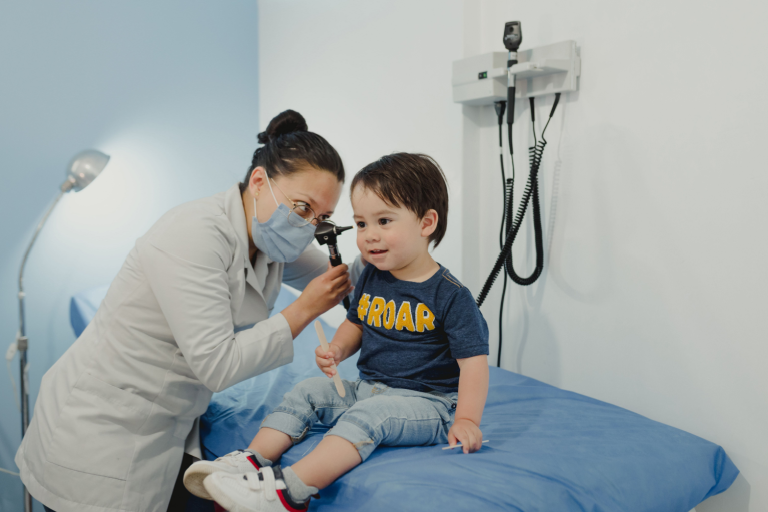
Home » Nursing Careers » Family Nurse Practitioner
Family Nurse Practitioner (FNP)
- Updated February 19, 2023
- by EveryNurse Staff

Family nurse practitioners use their knowledge to assess patients and provide an individualized plan of care. FNPs work in a variety of settings, including small hospitals and clinics, community-based outpatient clinics, academic medical centers, nursing homes, and schools. FNPs work autonomously or in collaboration with other healthcare providers with an additional focus on the promotion of health, prevention of illness, and early detection of disease.
What Is a Family Nurse Practitioner?
A family nurse practitioner is an advanced practice registered nurse (APRN) who provides comprehensive, coordinated, family-centered care to patients of all ages, genders, and ethnicities. They are very skilled in diagnosing and treating patients with complex illnesses, such as diabetes, heart disease, asthma, and HIV/AIDS. In addition to receiving extensive education in a variety of health care disciplines family nurse practitioners can become certified in a variety of areas including pediatric nursing.
FNPs have a broad scope of practice, often including prescription authority, to diagnose and treat patients with acute and chronic illnesses. They provide primary care that includes wellness services such as physicals, reproductive health, immunizations, and annual checkups. Many FNP’s are able to provide prenatal care, including the monitoring of the mother-to-be during pregnancy and delivery, ensuring comprehensive care for both mother and child. Some FNP’s may also be able to diagnose patients with congenital diseases such as phenylketonuria (PKU), sickle cell disease or galactosemia, or other hereditary conditions.
Frequently Asked Questions About FNPs
- What is the difference between a doctor and a nurse practitioner?
- What is the highest-paid nurse practitioner specialty?
- What nurse practitioner specialties are in the highest demand?
- What is the scope of a nurse practitioner’s practice?
- How does the growing number of nurse practitioners affect hospitals?
- What are three tips to overcome challenges as a new nurse practitioner?
What Does an FNP Do?
FNPs are trained to provide primary and preventive healthcare with a focus on chronic diseases, mental health, and child and family wellness. They are qualified to diagnose and treat complex health conditions, prescribe medications, order diagnostic tests, screen for disease symptoms, and perform physical exams. They also educate patients on healthy lifestyles and disease prevention.
FNPs also serve as leaders in the healthcare community, working with everyone from patients to public officials to ensure access to quality healthcare. They are well-versed in the latest research and current healthcare trends, and they often provide consultation on new or experimental treatments and therapies. They advise other healthcare providers and staff on how to effectively improve patient outcomes and provide care more efficiently. FNPs also work closely with patients and their families to help them manage chronic illnesses and prevent future complications. Some providers work in research or community outreach, guiding others to make healthy choices about everything from nutrition to exercise.
Family Nurse Practitioner Job Description
- Perform physical exams
- Diagnose physical and mental health conditions
- Evaluate, plan, implement, and monitor care
- Educate patients on health maintenance
- Track patient progress
- Monitor adherence to medication regimen, treatments, and preventative care plans
- Crate care plans/directives for patients with advanced illness or health conditions
- Manage patient accounts and records
How to Become a Family Nurse Practitioner
1. Become a Registered Nurse
The first step in becoming an FNP is becoming a registered nurse. You can start with a Bachelor of Science in Nursing degree, which will require four years of full-time study. There is no path to becoming a nurse practitioner without earning a nursing degree. In addition to your coursework and clinical experience as a nursing student, you’ll need to take a nationally accredited exam, the NCLEX-RN, which tests you on nursing fundamentals, including safe patient handling, infection control, chronic pain management, and more.
2. Earn an MSN or Doctor of Nursing Practice
All nurse practitioners regardless of specialization must hold a master’s degree or doctorate. A Master of Science in Nursing degree is typically a two-year program, although the time required may vary depending on how much clinical experience you have as an RN. A Doctor of Nursing Practice can typically be completed in under two years but may take 3-4 years depending on your education level entering the program and the course format (full-time or part-time). Both types of programs involve an intensive course of study as well as substantial clinical training.
3. Pass the FNP Certification Exam
The FNP certification examination is a competency-based exam offered by the the American Nurse Credentialing Center and the American Association of Nurse Practitioners. The exam is designed to assess an individual’s clinical knowledge and ability to practice competently as a family nurse practitioner. Both organizations are widely recognized and their certifications are accepted by all states.
4. Obtain Licensure in Your State
Related APRN Careers
Family Nurse Practitioner Salary
According to employment data published by ZipRecruiter.com and Salary.com, the range of salaries for FNPs in the United States falls between $104,364 and $122,179, with a median annual salary of $112,470. This median salary is the equivalent of $54.00 per hour, $2,162 per week, or $9,372 per month. FNPs in the top 90th percentile earned over $131,019, as of August 2021.
In general, the more experience a family nurse practitioner has, the higher salary they can expect to make. With the employment of nurse practitioners projected to increase by 45 percent through 2029, it is expected that salaries will increase steadily along with increased demand.















